Italian expert: Confucius and global unity explored at Nishan forum
(chinadaily.com.cn)| Updated : 2024-07-18
Print PrintEditor's note: Alberto Casartelli, an Italian native who teaches at Tianjin Foreign Studies University and serves as the deputy secretary of the ICCX (Italy-China Cultural Exchange), penned this article to share his insights and reflections from his participation in the just-concluded 10th Nishan Forum on World Civilizations in Qufu, Shandong province.
On July 9, 10 and 11, I had the pleasure, and the privilege, of participating as an international guest at the 10th Nishan Forum on World Civilizations.
My job as a professor of Italian culture at Tianjin Foreign Studies University places me daily in a situation where the meeting of cultures (the one I bring to my students, and the one my students bring to me) is a fundamental component of my work. So I knew that my presence at the forum would be a great opportunity to enrich my inclination in this aspect. But I must say that the reality far exceeded my expectations.
The three days at the Nishan forum were very intense, and every moment was rich in insights and inspiration. Registration for the event started on July 9. After the welcome dinner, guests were first treated to fantastic light and water displays, along with grandiose fireworks, and immediately afterwards to the fabulous Jinsheng Yuzhen theater performance. The performance masterfully recounted, along with rituals and music, the figure of Confucius as a teacher and educator (and the long journey of a child to become a wise elder), combining traditional classical Chinese art forms such as poetry, music, and dance with modern arts and cutting-edge theatrical technology, such as the moving stage, holographic displays, and dancers floating in the air. Truly a marvel for the eyes and the spirit.
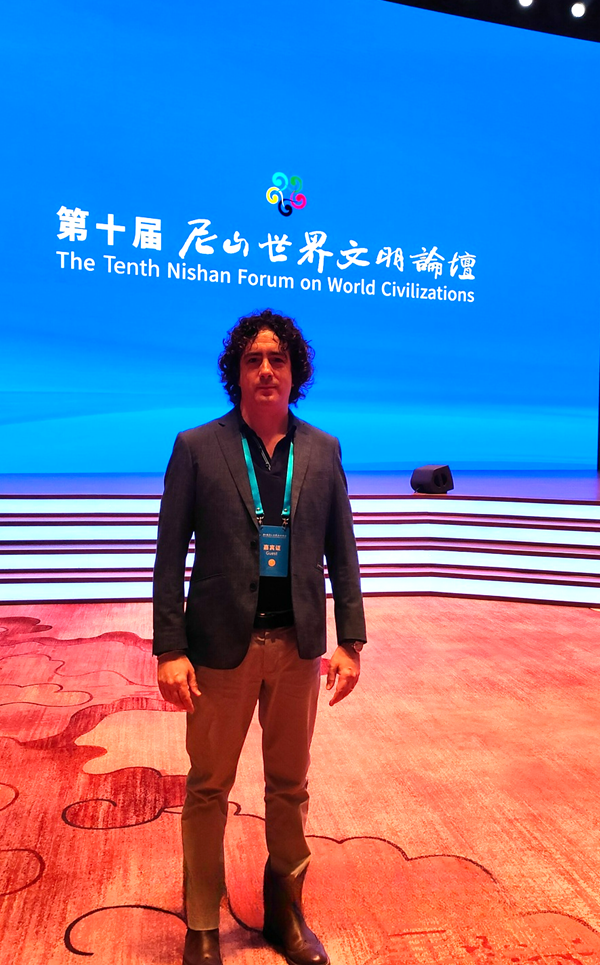
Alberto Casartelli poses for a photo during the 10th Nishan Forum on World Civilizations. [Photo provided to chinadaily.com.cn]
But what I would like to emphasize most in this article are the days of July 10 and 11, when the speakers' contributions brought us to the heart of the festival and best represented the spirit and meaning of the entire forum. The common themes of the speeches were memories of the past and inclusiveness. One is the essence of the other: there can be no inclusive society if it has no memory of its past. It was pointed out that these words already bring us back to the model of the teacher/educator that Confucius himself had described, namely the one who reviews the past to form those who will build the future. And from here we can connect to the fundamental role that education plays, so yesterday as well as today, that was often mentioned in the guests' speeches.
Reviewing and teaching one's own past, and one's own history, is the best way (if we don't want to say the only way) to understand histories and cultures different from our own, always with a great attitude of openness and mutual learning, always striving for unity and not division, to build a network of common values, learning from each other, appreciating each other, and promoting all forms of exchange. These values were mentioned many times at the forum, and I feel as close to this vision as one could possibly feel. A vision that defines the concept of national identity as something inclusive, and not, as I am unfortunately often used to hearing, as something divisive. True inclusiveness is one that celebrates differences rather than nullifying them, to create a truly more inclusive society, one that wants to respect the other rather than dominate, with a view to social stability that was already a fundamental principle in the teachings of Confucius. Just as fundamental was the idea and the culture of the family, which according to the great philosopher is the very root of civilization.
This is an era of great challenges, a complicated time when serious international tensions are undermining the balance without any signs of stopping, and this is very worrying. Never before has the concept of dialogue, ever present at this year's Nishan forum, been more important, and once again we should learn from our past and what our ancient civilizations have taught us. Even the place where the forum was held, a few kilometers from Qufu, the hometown of Confucius, is itself a symbol of brotherhood: Confucianism is a universal philosophy, a universal language of peace, in which ethics, morality, and social harmony are pursued. And we can say that Shandong is one of the cradles of world civilization, a place that sees its present rooted in a glorious history that goes back millennia.
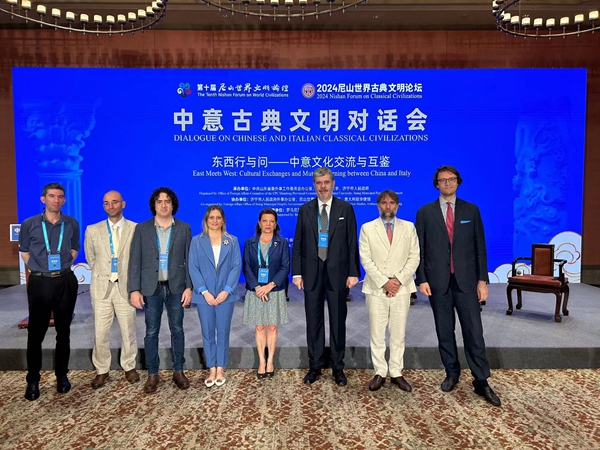
Alberto Casartelli (third, left) attends the parallel forum "Dialogue on Chinese and Italian Classical Civilizations" during Nishan forum. [Photo provided to chinadaily.com.cn]
On the role of our roots and cultures, both Western and Eastern, I have already had the opportunity to mention this in the paper I wrote for the forum, titled "The cultural and philosophical roots of Italy and China as the foundation for friendship and cooperation". I have tried in this paper to celebrate the cultures of our two great countries, and to emphasize how from the time of the Roman Empire, through the Middle Ages and the Renaissance, and to the modern age, they have often been intertwined: this should always be remembered as an impetus for the perpetual strengthening of our friendship and cooperation, especially in a year as important as this one, where we celebrate the 700th anniversary of Marco Polo's death, and the 20th anniversary of the bilateral strategic partnership between Italy and China.
The multipolar world that I have had the pleasure of seeing promoted here in Nishan forum and with whose idea I am totally in tune is just that: friendship, cooperation, respect, fostering modernization without ever losing focus on human values. This means combining tradition and modernity: it is the past that serves the present. It is the union of culture and civilization: two elements that are indispensable, and that interpenetrate each other.
Italy and China are fathers of two cultures (the Greco-Roman and the Eastern) that we can proudly call classical. And on what classicism is, I would like to conclude by echoing the words of our Ambassador Massimo Ambrosetti in his July 11 speech at the parallel forum "Dialogue on Chinese and Italian Classical Civilizations", in which he defined classical as "everything that has become a model, and that constitutes something universal".
And on these universal models, my hope is that the civilizations of the present will always fight for dialogue and inclusiveness, and always work to build a better world.

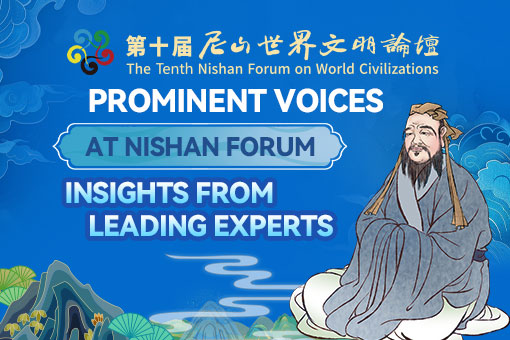 Insights from the 10th Nishan Forum
Insights from the 10th Nishan Forum 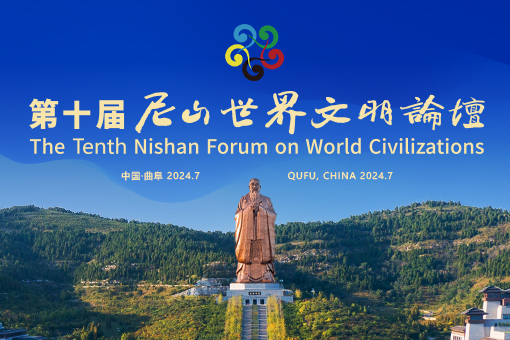 The Tenth Nishan Forum on World Civilizations
The Tenth Nishan Forum on World Civilizations 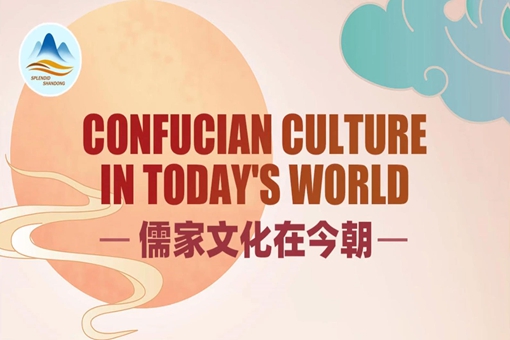 Confucian culture thrives: Integrating its wisdom into modern value
Confucian culture thrives: Integrating its wisdom into modern value